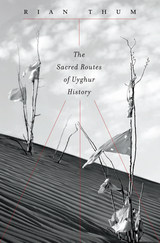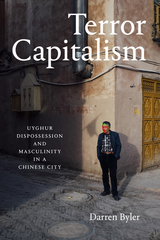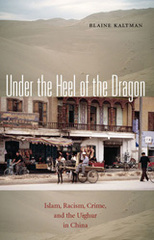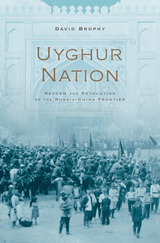
The Uyghurs, a Turkic group, account for half the population of the Xinjiang region in northwestern China. This ethnography presents a thick description of life in the Uyghur suburbs of Yining, a city near the border with Kazakhstan, and situates that account in a broader examination of Uyghur culture. Its four sections explore topics ranging from family life to market trading, from informal socializing to forms of religious devotion. Uniting these topics are an emphasis on the role folklore and personal narrative play in helping individuals situate themselves in and create communities and social groups, and a focus on how men’s concerns to advance themselves in an agonistic world of status competition shape social life in Uyghur communities.
The narrative is framed around the terms identity, community, and masculinity. As the author shows, Yining’s Uyghurs express a set of individual and collective identities organized around place, gender, family relations, friendships, occupation, and religious practice. In virtually every aspect of their daily lives, individuals and families are drawn into dense and overlapping networks of social relationships, united by a shared engagement with the place of men’s status competition within daily life in the community.

For 250 years, the Turkic Muslims of Altishahr—the vast desert region to the northwest of Tibet—have led an uneasy existence under Chinese rule. Today they call themselves Uyghurs, and they have cultivated a sense of history and identity that challenges Beijing’s official national narrative. Rian Thum argues that the roots of this history run deeper than recent conflicts, to a time when manuscripts and pilgrimage dominated understandings of the past. Beyond broadening our knowledge of tensions between the Uyghurs and the Chinese government, this meditation on the very concept of history probes the limits of human interaction with the past.
Uyghur historical practice emerged from the circulation of books and people during the Qing Dynasty, when crowds of pilgrims listened to history readings at the tombs of Islamic saints. Over time, amid long journeys and moving rituals, at oasis markets and desert shrines, ordinary readers adapted community-authored manuscripts to their own needs. In the process they created a window into a forgotten Islam, shaped by the veneration of local saints.
Partly insulated from the rest of the Islamic world, the Uyghurs constructed a local history that is at once unique and assimilates elements of Semitic, Iranic, Turkic, and Indic traditions—the cultural imports of Silk Road travelers. Through both ethnographic and historical analysis, The Sacred Routes of Uyghur History offers a new understanding of Uyghur historical practices, detailing the remarkable means by which this people reckons with its past and confronts its nationalist aspirations in the present day.


The Turkic Muslims known as the Uighur have long faced social and economic disadvantages in China because of their minority status. Under the Heel of the Dragon: Islam, Racism, Crime, and the Uighur in China offers a unique insight into current conflicts resulting from the rise of Islamic fundamentalism and the Chinese government’s oppression of religious minorities, issues that have heightened the degree of polarization between the Uighur and the dominant Chinese ethnic group, the Han.
Author Blaine Kaltman’s study is based on in-depth interviews that he conducted in Chinese without the aid of an interpreter or the knowledge of the Chinese government. These riveting conversations expose the thoughts of a wide socioeconomic spectrum of Han and Uighur, revealing their mutual prejudices. The Uighur believe that the Han discriminate against them in almost every aspect of their lives, and this perception of racism motivates Uighur prejudice against the Han.
Kaltman reports that criminal activity by Uighur is directed against their perceived oppressors, the Han Chinese. Uighur also resist Han authority by flouting the laws—such as tax and licensing regulations or prohibitions on the use or sale of hashish—that they consider to be imposed on them by an alien regime. Under the Heel of the Dragon offers a unique insight into a misunderstood world and a detailed explanation of the cultural perceptions that drive these misconceptions.

The meeting of the Russian and Qing empires in the nineteenth century had dramatic consequences for Central Asia’s Muslim communities. Along this frontier, a new political space emerged, shaped by competing imperial and spiritual loyalties, cross-border economic and social ties, and the revolutions that engulfed Russia and China in the early twentieth century. David Brophy explores how a community of Central Asian Muslims responded to these historic changes by reinventing themselves as the modern Uyghur nation.
As exiles and émigrés, traders and seasonal laborers, a diverse diaspora of Muslims from China’s northwest province of Xinjiang spread to Russian territory, where they became enmeshed in political and intellectual currents among Russia’s Muslims. From the many national and transnational discourses of identity that circulated in this mixed community, the rhetoric of Uyghur nationhood emerged as a rallying point in the tumult of the Bolshevik Revolution and Russian Civil War. Working both with and against Soviet policy, a shifting alliance of constituencies invoked the idea of a Uyghur nation to secure a place for itself in Soviet Central Asia and to spread the revolution to Xinjiang. Although its existence was contested in the fractious politics of the 1920s, in the 1930s the Uyghur nation achieved official recognition in the Soviet Union and China.
Grounded in a wealth of little-known archives from across Eurasia, Uyghur Nation offers a bottom-up perspective on nation-building in the Soviet Union and China and provides crucial background to the ongoing contest for the history and identity of Xinjiang.
READERS
Browse our collection.
PUBLISHERS
See BiblioVault's publisher services.
STUDENT SERVICES
Files for college accessibility offices.
UChicago Accessibility Resources
home | accessibility | search | about | contact us
BiblioVault ® 2001 - 2024
The University of Chicago Press









